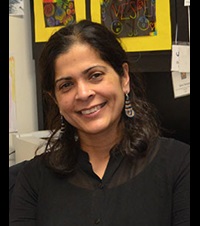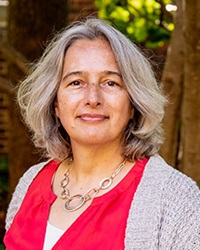The College of Engineering is pleased to present the annual Introduce a Girl to Engineering Day, Saturday, Feb. 24, 2018, from 10 a.m. to 2 p.m. The program continues Drexel’s commitment to civic engagement that underscores what we do best and enriches the lives of those in our community. We asked a couple of Drexel’s engineering faculty for advice we hope will encourage young women to follow in their footsteps. Featured on our “e-panel” below are:
Simi Hoque, PhD
Associate Professor
Department of Civil, Architectural, and Environmental Engineering
Caroline Schauer, PhD
Associate Professor
Department of Materials Science and Engineering
Karen Miu, PhD
Professor
Department of Electrical and Computer Engineering
Christine Fiori, PhD, PE
Clinical Professor and Program Director
Department of Engineering Management
WHY DID YOU CHOOSE A CAREER IN ENGINEERING?

Simi Hoque
SIMI HOQUE: I enjoy problem solving. I like trying to envision the most efficient and straightforward way to get a job done. I also knew that I wanted to create things that would exist in the physical world and that I wanted them to be beautiful, functional, and long lasting. So I studied civil engineering and architecture. Now, I bring those two disciplines together in my work as an architectural engineer.
One of the most important contributors is that I was supported by teachers, parents, and supervisors who believed that I could succeed in whatever I put myself to and consistently reinforced my strengths and abilities. It’s true that the curriculum for an engineering college student is extremely challenging, but having those supporters and mentors helped me get through it even when I felt discouraged and defeated.

Caroline Schauer
CAROLINE SCHAUER: I fell in love with chemistry during my first year of college. After getting my PhD in chemistry with a materials science and engineering twist, I did three post-docs that led me closer to becoming more of a materials engineer. I began my first faculty position in an engineering department, and I use my chemistry on a daily basis.
KAREN MIU: I enjoyed solving problems—puzzles, games, scavenger hunts, etc.—and having a sense of progress. In addition, math and science problems seemed more interesting to me as they had a chance of making a larger practical/societal impact. Therefore, I selected engineering.
CHRISTINE FIORI: I thought I wanted to be an architect until my father, who was a carpenter, brought me to a construction site and I spoke with the project manager. He helped me understand that my desire to know how things are designed and then how they are built was more in line with what a career in engineering would prepare me to do. I loved to build, be in the field, and really engage with how materials and people come together, so civil engineering was the best fit for me.
WHAT ARE THE BEST COURSES TO TAKE IN HIGH SCHOOL TO PREPARE FOR COLLEGE-LEVEL ENGINEERING?
HOQUE: Having some confidence around the use of computers to make models, to code, or to solve problems would be useful. I also think that engineers today need to be more contextually aware of the impact of what we do. I would strongly urge any budding engineer to be aware of how engineering must be practiced with an understanding of history, society, and culture.
SCHAUER: Math, chemistry, biology, and physics.
MIU: For engineering literacy, you should have strength in math courses. And, if available, programming courses are very important, too.
FIORI: In high school, it is very important to take courses in physics and math. I found that my physics class helped me the most in my engineering degree. It gave me the fundamental knowledge to build upon.
WHAT IS YOUR BEST ADVICE FOR YOUNG WOMEN WHO WANT TO PURSUE ENGINEERING?
HOQUE:
- Find your group. These are people who you can count on who will support you when you are having a tough time, and will inoculate you against folks who want to hold you back. Make sure that your group is diverse – it should have people who are your friends as well as people who you look up to (like teachers, counselors, advisors, parents, older siblings, etc.).
- Work hard, but never harder than you have to. This is what engineers do—it’s called optimization. It’ll serve you well when you’re taking 18 credits, and you have crew practice, and you’re in an improv comedy troupe, and you want to go out with your friends.
- Read books and articles, listen to podcasts and news related to your chosen area of engineering. Every engineering profession has a magazine that showcases the latest developments in their field. For example, mechanical engineers have the ASHRAE Journal. Civil Engineers have the ASCE journals. Stay abreast of what’s happening.
SCHAUER: You don’t have to be a superstar and have perfect grades with all the activities in order to be a great engineer. You just have to love solving real-world problems and helping people.
MIU: Don't be afraid to tinker. Engineers have to try lots of different things before finding what works "best."
FIORI: Try it! Engineers help society and they shape the world in which we live. It is an exciting career field in which you can exercise your scientific brain and your creativity to develop innovations that can change the future. It is challenging. However, the reward is great.